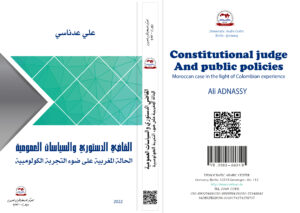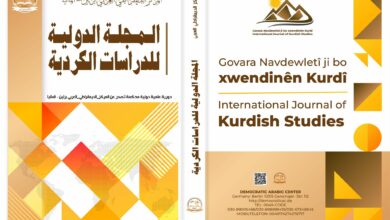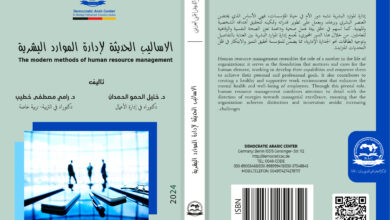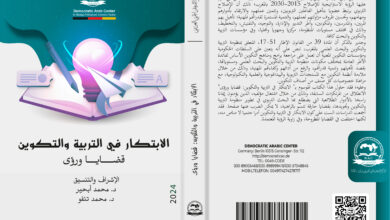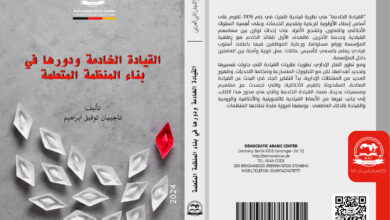القاضي الدستوري والسياسات العمومية الحالة المغربية على ضوء التجربة الكولومبية
Constitutional judge and public policies Moroccan case in the light of Colombian experience
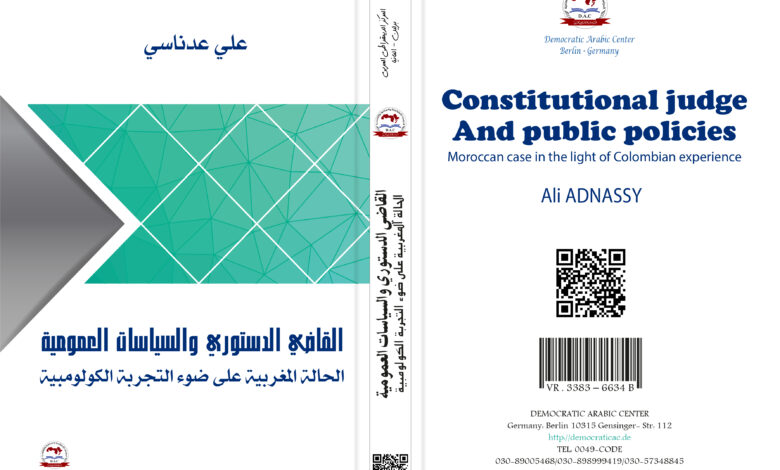
تأليف : علي عدناسي
نسخة “pdf”-
القاضي الدستوري والسياسات العمومية الحالة المغربية على ضوء التجربة الكولومبية
الطبعة الأولى “2022″ –من كتاب: – القاضي الدستوري والسياسات العمومية الحالة المغربية على ضوء التجربة الكولومبية
جميع حقوق الطبع محفوظة #المركز_الديمقراطي_العربي ولا يسمح بإعادة إصدار هذا الكتاب أو اي جزء منه أو تخزينه في نطاق إستعادة المعلومات أو نقله بأي شكل من الأشكال، دون إذن مسبق خطي من الناشر .
تقديم:
دفعني إلى الاهتمام بالموضوع كون المغرب من الأنظمة الدستورية، التي تتبنى منظومة الحقوق والحريات في بعدها الكوني، الشيء الذي يدفع إلى التساؤل حول مدى احترام الممارسات والسياسات لمقتضيات الدستور والمواثيق الدولية. من هنا انبثقت الإشكالية الموجهة لبحثي المتواضع؛ إذ انطلقتُ من حقيقة أن المغرب يتوفر على قضاء دستوري، لكنه لم يحظ باهتمام نظري وتحليلي يتناول طبيعته وهيكلته وحضوره وفعاليته ونجاعته.
تقتضي مقاربة هذه الإشكالية مقاربة نظرية وتحليلية تهدف إلى تقييم القضاء الدستوري المغربي ورصد مدى حمايته للحقوق والحريات الدستورية، بالموازاة مع التطور الذي شهده هذا القضاء، وأيضا بالموازاة مع التغيرات الدستورية وتطور الحقوق والحريات، وبالتالي بناء تصور حول التجربة المغربية في هذا المجال؛ وقد اعتمدت في بناء هذا التقييم على مقارنة الحالة المغربية على ضوء التجربة الكولومبية.
ولقد بنيت اختياري للتجربة الكولومبية على كونها:
- تجربة متقدمة في مجال القضاء الدستوري الفعال والمتفاعل مع محيطه الدستوري والحقوقي، وانفتاحه على التجربة الدستورية الفرنسية وتجربة الولايات المتحدة الأمريكية.
- التشابه الحاصل بين البنيتين الاجتماعية والاقتصادية، وهشاشة الجوانب الحقوقية والمؤسساتية، والتي تسمح بارتكاب تجاوزات وخروقات تستدعي تدخل القاضي الدستوري.
- تقدم التجربة الكولومبية آليات لقياس الحالة المغربية، وهنا تكتسي المقارنة أهمية منهجية، وقدرة على الكشف والتحليل.
وقد اكتفيت في عرض التجربة الكولومبية بالاعتماد على دراسة قيمة حول ” القاضي الدستوري: فاعل في السياسات العمومية1 ” للباحث والقاضي الدستوري الكولومبي جان كارلوس هاناو بيريز2، لعمق مفاهيمها، ودقة تحليلها، وتنوع إحالاتها. هكذا قسمت عملي إلى فصلين:
تناولت في الفصل الأول القاضي الدستوري والسياسات العمومية في التجربة الكولومبية، حيث تناولت في المبحث الأول القاضي الدستوري كمدبر للسياسات العمومية، وقسمته إلى مطلبين. أما المبحث الثاني فيتناول حدود تدخل القاضي الدستوري في السياسات العمومية في مطلبين.
في المقابل تناولت في الفصل الثاني تأملات في الحالة المغربية، من خلال مبحثين. تطرقت في المبحث الأول إلى تطور القضاء الدستوري المغربي، وتطرقت في المبحث الثاني إلى القاضي الدستوري المغربي والسياسات العمومية.
والخلاصة أن القاضي الدستوري المغربي أبعد ما يكون عن الفعل في السياسات العمومية. وأن التجربة المغربية تحتاج إلى الكثير من الإرادة والآليات لتحرير القضاء الدستوري من التبعية الإدارية، والتقيد بحرفية النص الدستوري، وامتلاك شجاعة الاجتهاد القضائي، حتى يكون فاعلا سياسيا قادرا على التأثير في السياسات العمومية.
Ali ADNASSY
Abstract
Morocco is one of constitutional regimes which adopts the system of right and freedoms in its universal dimension, thing that drives to the question about the extent to wich practices and policies respect the requirements of the constitution and covenants, from here emerged the problem of my research.
Proceeding from the fact that Morocco has a constitutional judiciary but it has not received theoretical and analytical attention on its nature, structure, presence, effectiveness and efficiency.
Approching this problem requires a theoretical and analytical approch aimed at evaluating the Morocco constitutional judiciairy and monitoring the extent to which it protects constitutional rights and freedoms, in parallel with of this judiciary as well as with constitutional changes and the development of rights and freedoms, to build a percetion about the Moroccan experience in this field based on comparison of Moroccan case in the light of Colombian experience.
My choice of Colombian experience was built on being :
- Advanced experience in the field interacting with its constitutional and human rights environment and its openness to French and United States of America experience.
- The similarity between the social and economic structures and the fragility of the legal and institutional aspects which allow abuses and violations that require the intervention of the constitutional judge.
- The Colombian experience provides mechanisms for measuring the Moroccan situation and ability to detect and analyse.
In presenting Colombia’s experience by relying on a valuable study on
« The constitutional judge : an actor in public polices » by jean Carlos Henao Perez due to the depth of her concepts, the accuracy of its analysis, and the diversity of its referrals.
That’s how I divided my work into two chapters :
- In the first chapter, I covered the constitutional judge and public policies in Colombian experience.
In the first topic I dealt with the constitutional judge as a manager of public policies and divided it into two requirements.
The second topic deals with the limits of the constitutional judge’s interference in public policies in two requirements.
- In the second chapter, I dealt with reflections on the Moroccan situation through two topics.
In the first topic, I touched the development of the Moroccan constitutional judiciary and in the second topic I touched the Moroccan constitutional judge and public policies.
In conclusion the Moroccan constitutional judge is far from acting in public policies and the Moroccan experience needs a lot of will and mechanisms to liberate the constitutional judiciary from administrative subordination, adherence to the literlly constitutional text and having the courage of jurisprudence in order to be a political actor capable of influencing in public policies.
- الناشر: المركز الديمقراطي العربي للدراسات الإستراتيجية والسياسية والاقتصادية

